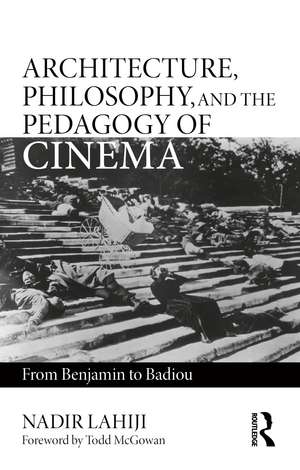Architecture, Philosophy, and the Pedagogy of Cinema: From Benjamin to Badiou
Autor Nadir Lahijien Limba Engleză Paperback – 27 mai 2021
Building art puts the collective mass in the position of an ‘expert critic’ who identifies themselves with the technical apparatus of architecture. Only then can architecture regain its status as ‘mass art’ and, as the book contends, only then can it resume its function as the only ‘artform’ that is designed for the political pedagogy of masses, which originally belonged to it in the period of modernity before the invention of cinema.
| Toate formatele și edițiile | Preț | Express |
|---|---|---|
| Paperback (1) | 237.65 lei 6-8 săpt. | |
| Taylor & Francis – 27 mai 2021 | 237.65 lei 6-8 săpt. | |
| Hardback (1) | 762.16 lei 6-8 săpt. | |
| Taylor & Francis – 27 mai 2021 | 762.16 lei 6-8 săpt. |
Preț: 237.65 lei
Preț vechi: 286.99 lei
-17% Nou
Puncte Express: 356
Preț estimativ în valută:
45.48€ • 49.38$ • 38.20£
45.48€ • 49.38$ • 38.20£
Carte tipărită la comandă
Livrare economică 23 aprilie-07 mai
Preluare comenzi: 021 569.72.76
Specificații
ISBN-13: 9780367762827
ISBN-10: 036776282X
Pagini: 190
Ilustrații: 1 Halftones, black and white; 1 Illustrations, black and white
Dimensiuni: 138 x 216 x 13 mm
Greutate: 0.28 kg
Ediția:1
Editura: Taylor & Francis
Colecția Routledge
Locul publicării:Oxford, United Kingdom
ISBN-10: 036776282X
Pagini: 190
Ilustrații: 1 Halftones, black and white; 1 Illustrations, black and white
Dimensiuni: 138 x 216 x 13 mm
Greutate: 0.28 kg
Ediția:1
Editura: Taylor & Francis
Colecția Routledge
Locul publicării:Oxford, United Kingdom
Public țintă
Postgraduate and Undergraduate AdvancedCuprins
1. Returning to Philosophy of Masses: Benjamin and Badiou 2. From the Photographic Moment of Critical Philosophy to the Optical Unconscious 3. Mass Art and Impurity: Reading Benjamin with Badiou 4. In and Out of Plato’s Cave 5. Theory of Distraction: Tactile and Optical 6. Poverty of Experience 7. Dialectics and Mass Art 8. The Proletarian Mise-en-Scène
Notă biografică
Nadir Lahiji is an architect. He holds a Ph.D. in architecture theory from the University of Pennsylvania. He is most recently the author of Architecture or Revolution: Emancipatory Critique after Marx (Routledge, 2020) and An Architecture Manifesto: Critical Reason and Theories of a Failed Practice (Routledge, 2019). His previous publications include, among others, Adventures with the Theory of the Baroque and French Philosophy (2016), and the co-authored The Architecture of Phantasmagoria: Specters of the City (Routledge, 2017).
Recenzii
'Articulated with rare philosophical intelligence and political incisiveness, Nadir Lahiji’s new book proposes architecture as the preeminent art of the masses, one that is closer to cinema than to the other arts. A training ground for our wider confrontations with a technological capitalist modernity, architecture emerges once again as the best hope for a political pedagogy of the masses and for the formation of new political subjectivities. Brilliantly reading Walter Benjamin with Alain Badiou, psychoanalytic criticism with film theory, Architecture, Philosophy, and the Pedagogy of Cinema summons us to rethink the very project of architectural production today.'
David Cunningham, Institute for Modern and Contemporary Culture, University of Westminster
'A seminal contribution to the political philosophy of architecture that extends, updates, and actualizes some of Benjamin’s most far-reaching reflections on the crisis of perception towards a new perspective on architecture as a "mass art" in the time of digital capitalism, after the end of cinema. For sheer intellectual stimulation, few can match Lahiji’s inquisitive probing of architecture’s contemporary predicament.'
Libero Andreotti, Professor Emeritus of Architecture, Georgia Tech
'Architecture, Philosophy, and the Pedagogy of Cinema: From Benjamin to Badiou puts forward the challenging case for architecture as the only living mass art with revolutionary political potential. Nadir Lahiji argues persuasively that the emergence of the masses as "historical subject" is aided by a radical restructuring of perception; as cinema in the modern period reshaped the social imaginary, so architecture can perform this role today.'
Christopher Kul-Want, Course Leader, MRes Art Theory & Philosophy, Central Saint Martins, University of the Arts London
David Cunningham, Institute for Modern and Contemporary Culture, University of Westminster
'A seminal contribution to the political philosophy of architecture that extends, updates, and actualizes some of Benjamin’s most far-reaching reflections on the crisis of perception towards a new perspective on architecture as a "mass art" in the time of digital capitalism, after the end of cinema. For sheer intellectual stimulation, few can match Lahiji’s inquisitive probing of architecture’s contemporary predicament.'
Libero Andreotti, Professor Emeritus of Architecture, Georgia Tech
'Architecture, Philosophy, and the Pedagogy of Cinema: From Benjamin to Badiou puts forward the challenging case for architecture as the only living mass art with revolutionary political potential. Nadir Lahiji argues persuasively that the emergence of the masses as "historical subject" is aided by a radical restructuring of perception; as cinema in the modern period reshaped the social imaginary, so architecture can perform this role today.'
Christopher Kul-Want, Course Leader, MRes Art Theory & Philosophy, Central Saint Martins, University of the Arts London
Descriere
Philosophers on the art of cinema mainly remain silent about architecture. Nadir Lahiji proposes that the philosophical understanding of the collective human sensorium in the apparatus of perception must once again find its true training ground in architecture.
